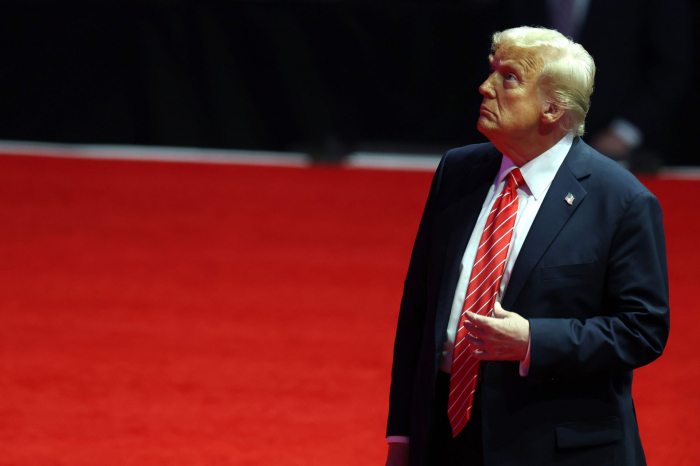Donald Trump has taken back the White House, threatening to upend the world order and build a new American empire, from Panama to Greenland. So far, Europe’s politicians and bureaucrats have resolutely refused to explode in outrage.
The response to Trump’s fiery inauguration address from the corridors of the European Commission in Brussels was muted. Commission President Ursula von der Leyen didn’t even mention him by name in her speech at Davos on Tuesday.
Elsewhere, too, there was minimal pearl-clutching or gnashing of teeth when Trump withdrew from the Paris climate agreement, and only muffled grumbling when he scorned the World Health Organization and began the process of pulling out.
On the big three questions facing European and British leaders, the newly sworn-in president has so far been mostly silent: ongoing support for Ukraine, sweeping new tariffs, and the future of NATO as the continent’s security umbrella.
The tranquil response to Trump has been both deliberate and tactical. Europe doesn’t want to start any fights with the unpredictable new American leader, and understands that public moralizing only backfires.
“Cool heads are needed,” German Chancellor Olaf Scholz said at the World Economic Forum in Davos on Tuesday. “It is perfectly clear that President Trump and his administration will keep the world on tenterhooks in the coming years, in energy and climate policy, in trade policy, in foreign and security policy and in many other areas.”
But Europe’s sang-froid should not be mistaken as pandering, Scholz added: “We can and will deal with all of this without unnecessary excitement and indignation.”
Be prepared
While it’s clear Europe doesn’t want to be at odds with the United States, it has also done much more work to prepare for conflicts this time than it had ahead of Trump’s first term.
On trade, Brussels and London have been war-gaming scenarios for months and have readied an arsenal of weapons for a trade war if necessary. Officials hope Trump can be persuaded not to hit European exports with punitive tariffs but are ready with a full range of responses including retaliatory tariffs, according to people familiar with the matter.
In his inauguration speech Trump held fire on tariffs, leaving Europe with little to complain about in the moment. His executive order outlining an “America First” trade policy instructed his team merely to explore the idea of universal tariffs. While it called for an overhaul of a first-term trade deal he struck with China, and for action to address trade imbalances and currency manipulation by America’s trading partners, it made no direct reference to Europe.
Hours after being sworn in, Trump offered the EU a route to avoid a trade war, saying: “The one thing they can do quickly is buy our oil and gas.”
On Tuesday the European Commission confirmed to POLITICO that it was taking the offer seriously and would follow up directly with White House officials. “We need to establish contact with them and see how to move forward,” said energy spokesperson Anna-Kaisa Itkonen. “The priority is to have a conversation, to engage early, discuss common interests and then be ready to negotiate.”
On supporting Ukraine, too, European leaders, including Britain’s new Prime Minister Keir Starmer, have been rapidly working on plans to show they are ready to take up the burden and negotiate future arrangements with Trump. That’s for two reasons: in case they need to, and to show Trump they are reliable collaborators and are not just freeloading.
“Trump is an interests-based politician rather than a values-based politician,” a senior Western official said. “So you have to appeal to his interests. It won’t be in his interests to look like Putin has won or he’s got a bad deal.”
Aside from denting Trump’s pride — always a powerful motivator — getting an obviously bad deal on Ukraine would risk emboldening China, another thing the president would hate, the official added.
In the past Trump has horrified America’s allies by suggesting he could pull the U.S. out of NATO. He’s proposed a new target for NATO members to spend 5 percent of GDP on defense, up from the alliance’s current target of 2 percent, which many European countries still fail to meet.
On Tuesday, Estonia and France added their voices to those backing Trump’s call for higher spending on defense.
An EU official added: “The fact that we need to do more on defense at [the] EU level is definitely not a novelty and is linked more to Putin and Russia’s threat than to who sits in the White House.”
Maybe. But the arrival of Trump has undoubtedly focused minds.
“They have been quite forward-looking on the defense and security agenda,” said Mujtaba Rahman, managing director for Europe at the Eurasia Group. “And on trade, they have got a large number of measures that are ready to go but they’re not going to press fire until they know what Trump is going to do.”
That’s the real problem: Trump is impulsive and it’s impossible to know what he may decide to do next.
“At a time of major war on the continent, the stakes for Europe in correctly calibrating its response are greater than [for] any other region in the world,” said Leslie Vinjamuri, Americas director at the Chatham House think tank in London. “He has shown he remains unpredictable and willing to test the boundaries of US alliances in totally unexpected ways. That makes understanding his intentions both urgent for world leaders — and incredibly hard.”
The original article was published in the Politico.
Rory O’Neill, Karl Mathiesen, Emily Schultheis, Gabriel Gavin, Giovanna Coi, Jordyn Dahl, and Douglas Busvine contributed reporting.
More about:
















































